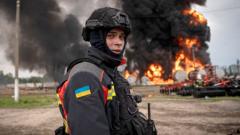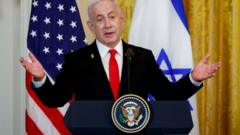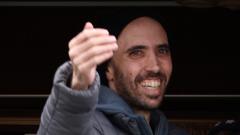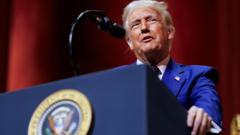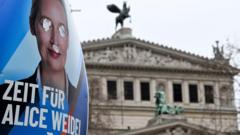Hezbollah supporters gather to commemorate their fallen leaders while regional conflict continues to unfold.
Massive Turnout Marks Funeral of Hezbollah Leader Hassan Nasrallah
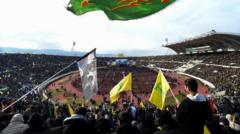
Massive Turnout Marks Funeral of Hezbollah Leader Hassan Nasrallah
Mourners Pay Tribute Amid Continued Tensions in Lebanon
Large crowds gathered in Beirut to honor Hassan Nasrallah, the former leader of Hezbollah, killed by an Israeli airstrike in September. The funeral event brought together thousands of mourners dressed in black who congregated at the Camille Chamoun Sports City stadium, demonstrating significant support for Hezbollah, especially in the wake of the tumultuous year that saw the deaths of both Nasrallah and his successor, Hashem Safieddine.
The event was marked by displays of loyalty, including flags and photographs of the leaders, as well as recordings of Nasrallah's speeches played to a gathered audience. Naim Qassem, the current leader of Hezbollah, addressed the crowds via video, reaffirming the group's resilience. The mourners' sentiments expressed a deep commitment to Hezbollah's cause, with many viewing Nasrallah's contributions to the organization and the broader regional struggle as noteworthy sacrifices.
Concurrent with the funeral, Israel conducted airstrikes targeting Hezbollah positions, underscoring ongoing tensions. Iran's foreign minister and representatives from allied groups attended, labeling Nasrallah and Safieddine as "heroes of the resistance." The mass turnout was interpreted as a demonstration of strength from Hezbollah amidst ongoing military challenges against Israel, following significant loss of life in recent conflicts.
The deaths of senior leaders have dealt considerable blows to Hezbollah, highlighting both the risks they face and the enduring commitment of their supporters, even as Lebanon grapples with profound political and humanitarian crises brought on by repeated conflict and internal challenges.
The event was marked by displays of loyalty, including flags and photographs of the leaders, as well as recordings of Nasrallah's speeches played to a gathered audience. Naim Qassem, the current leader of Hezbollah, addressed the crowds via video, reaffirming the group's resilience. The mourners' sentiments expressed a deep commitment to Hezbollah's cause, with many viewing Nasrallah's contributions to the organization and the broader regional struggle as noteworthy sacrifices.
Concurrent with the funeral, Israel conducted airstrikes targeting Hezbollah positions, underscoring ongoing tensions. Iran's foreign minister and representatives from allied groups attended, labeling Nasrallah and Safieddine as "heroes of the resistance." The mass turnout was interpreted as a demonstration of strength from Hezbollah amidst ongoing military challenges against Israel, following significant loss of life in recent conflicts.
The deaths of senior leaders have dealt considerable blows to Hezbollah, highlighting both the risks they face and the enduring commitment of their supporters, even as Lebanon grapples with profound political and humanitarian crises brought on by repeated conflict and internal challenges.

